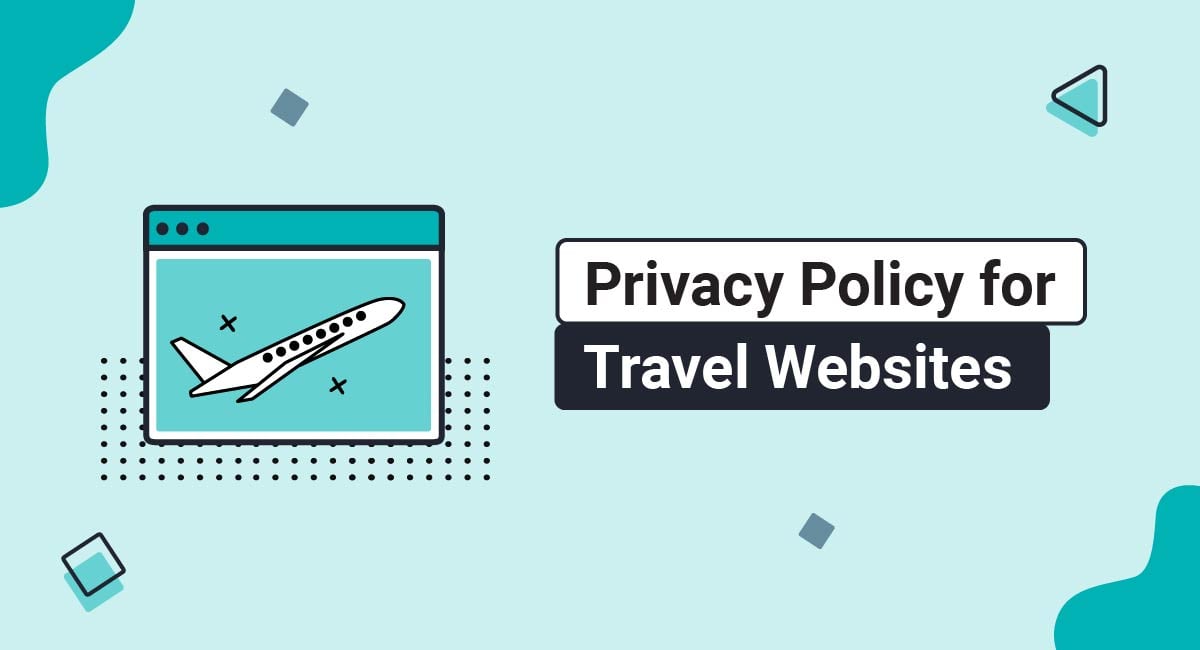

If you run a travel website, you will legally need to have and post a compliant Privacy Policy. This is because privacy laws require a Privacy Policy when personal information is collected, and your travel website is likely collecting a variety of personal information.
This article will explore why your travel website needs a Privacy Policy and how you can create and display one effortlessly.
Our Privacy Policy Generator makes it easy to create a Privacy Policy for your business. Just follow these steps:



 You'll be able to instantly access and download your new Privacy Policy.
You'll be able to instantly access and download your new Privacy Policy.A Privacy Policy is a legal document that discloses how you collect personal personal information, what you do with it, and what rights end users have regarding all of this.
Your Privacy Policy must inform visitors what types of personal information you collect, such as their email addresses or phone numbers. It must disclose how you process that personal information. If you share the personal information with third parties, for example, you should disclose that in your Privacy Policy.
If there are cookies on your site that track your visitors' browsing history, your Privacy Policy should also mention that. Cookies are small snippets of code that let you know if a person has visited your site before.
If your website collects your visitors' personal information, you are legally required to have a Privacy Policy.
Here are some examples of actions for which a Privacy Policy is mandatory:
There are various laws in different regions that make a Privacy Policy mandatory for any website that collects personal information, including travel websites. These laws include but are not limited to:
Here are some of the benefits of having a Privacy Policy on your travel website.
The most important benefit you will achieve is legal compliance.
As stated earlier, in many regions a Privacy Policy is required by law. Various regions and jurisdictions have implemented privacy laws. As a national or global travel services provider, having a Privacy Policy will help you stay compliant in all jurisdictions you operate.
Having a Privacy Policy helps build trust with skeptical consumers who are diligent about protecting their privacy. Having a Privacy Policy demonstrates that you take your customers' privacy seriously, making it easier for them to trust you with their information. You can increase your conversion rate by maintaining trust and transparency.
Furthermore, since having a Privacy Policy is standard nowadays, a lack of a Privacy Policy could prevent consumers from looking at you as an authority in your industry. To build your reputation in the industry and improve your brand image, a strong commitment to transparency and personal information protection is critical.
By portraying your business as one that is dedicated to maintaining your customers' privacy, you also gain a marketing advantage, especially in a time when concerns about online safety are at an all-time high.
Your travel website's Privacy Policy should contain several clauses outlining how you collect personal information and how you process it. Here are some of the most important clauses your Privacy Policy should have.
Your Privacy Policy should inform visitors which personal information you collect. This may include:
Here's an example of how this clause can be written. Note how it uses a list format to clearly break down the different types of personal data collected, and even gives helpful examples of each:

Here's another example of a clause disclosing this information in a clear and organized way:
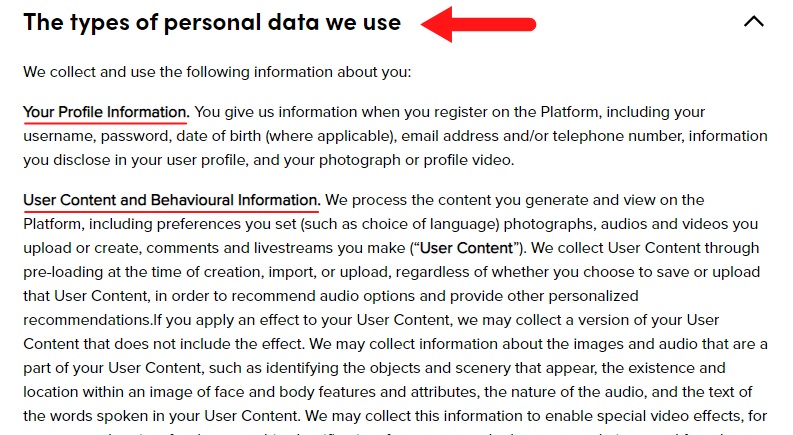
Your Privacy Policy must contain a section detailing the purposes, or reasons why, you collect the personal information you collect.
For example, a person's email address or phone number might be collected to enable users to create an account.
Here's an example:
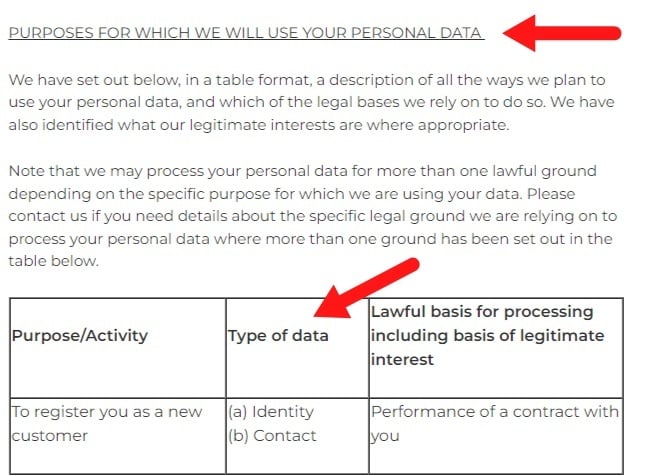 Radley Privacy and Cookie Policy: Purposes for Which We Use Your Personal Data clause excerpt" width="652" height="475" />
Radley Privacy and Cookie Policy: Purposes for Which We Use Your Personal Data clause excerpt" width="652" height="475" />
Here's another example of the information presented in a list format:

If you share personal information with third parties, you should have a clause explaining how, why, and with whom you share the personal information.
For example, if you operate an OTA (Online Travel Agent) website, you will need to share customers' details with the airlines you book them with.
Here's an example of this from Booking.com:
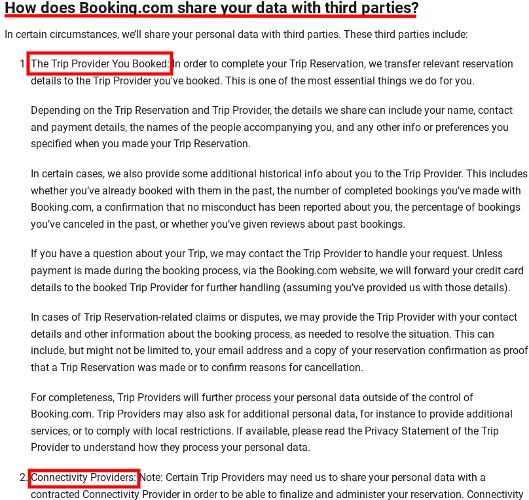
Privacy laws require businesses to inform consumers about their rights regarding their private personal information.
For example, the CCPA/CPRA requires businesses to inform consumers about their right to access the personal information collected about them and their right to submit a deletion request, amongst others.
Airbnb does this by providing a table that explains user privacy rights:
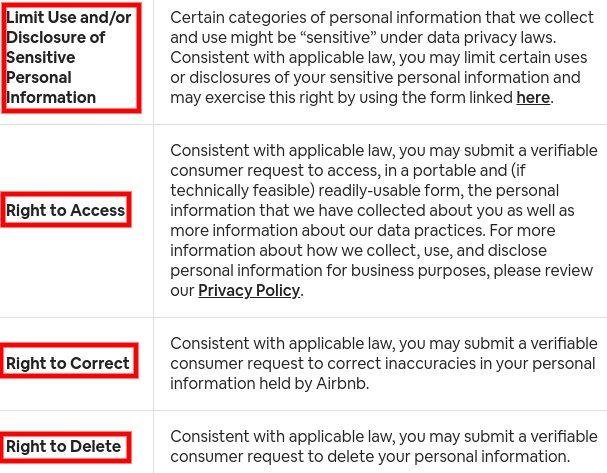
Always include at least one method for users to contact you if they have any questions regarding their privacy rights or your privacy practices. This can be a phone number, email address, online contact form, or any other method that works.
Make sure to display this information within your Privacy Policy.
Here's an example of a clause that discloses a number of ways a user can contact the company:
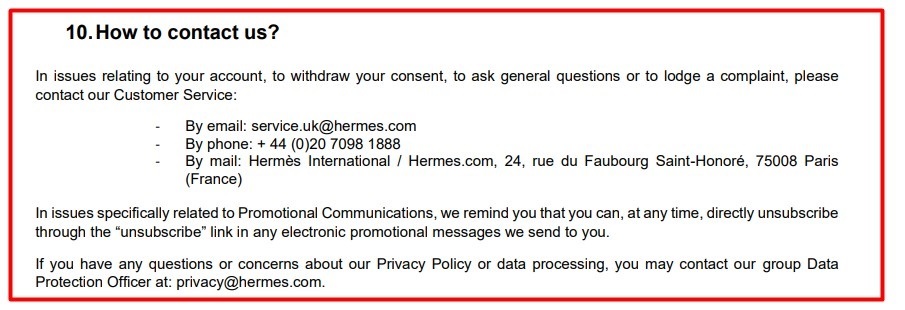
When displaying your Privacy Policy, place it in areas where it will be easily accessible to visitors at any and all times.
By including your Privacy Policy in the footer, you can ensure that it shows up on every page across your site. Your website footer is a great place to add a link to your Privacy Policy. Users know to look here for important links, too.
Here's how Spirit Airlines does this:
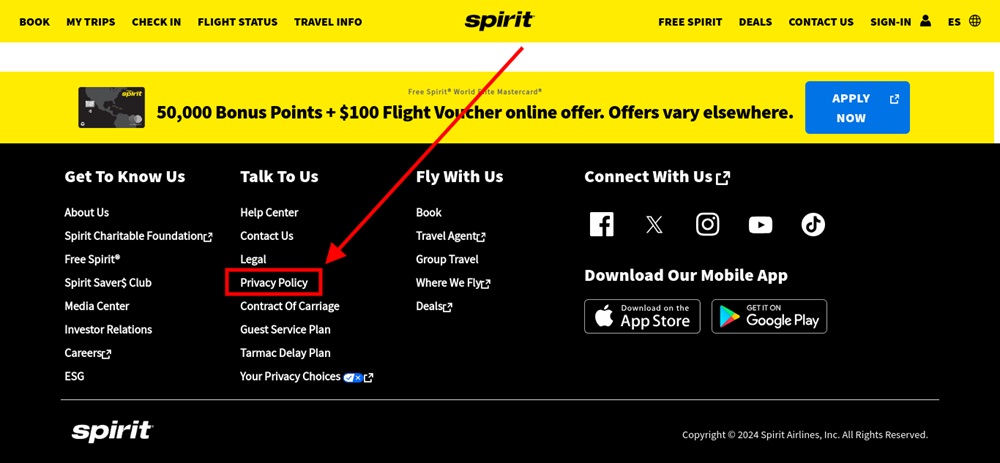
Similarly, Hotels.com includes a link to its Privacy Policy in a footer menu titled Policies:
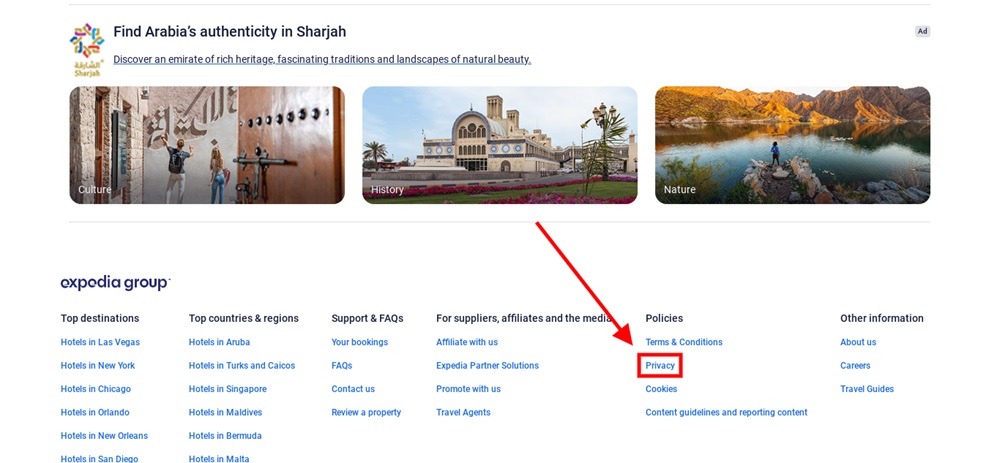
In addition, you should display your Privacy Policy to visitors when you collect personal information.
Some examples of such places can be:
Here's how this can look:
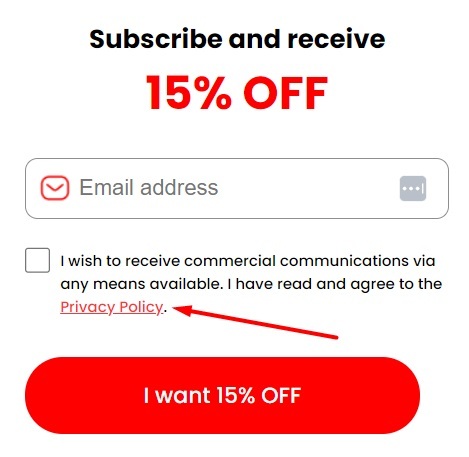
If you have a mobile app, include a link to your Privacy Policy within an in-app menu. Common placement is within a Settings or Legal menu, as seen here:
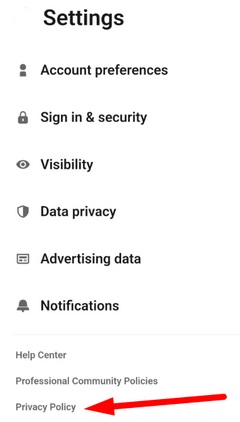
The best way to obtain consent to your Privacy Policy is to provide a checkbox which users can tick off as a method of providing consent. This is referred to widely as an "I Agree" checkbox.
Add a checkbox next to a statement that makes it very clear that by checking that box, the user is explicitly agreeing to your Privacy Policy. Link to the Privacy Policy as well so users can quickly and conveniently access information about your privacy practices before giving their consent.
Here's an example. You can see how the text next to the checkbox makes it abundantly clear what checking the box will do:
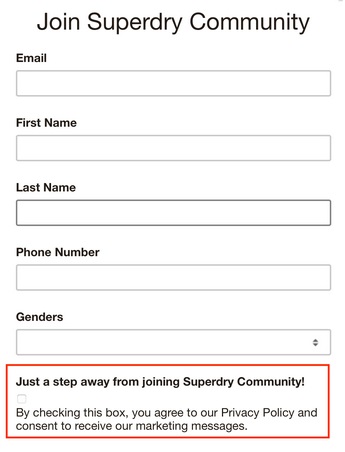
Here's another example. Note the links included to the relevant legal agreements, including a Privacy Notice:
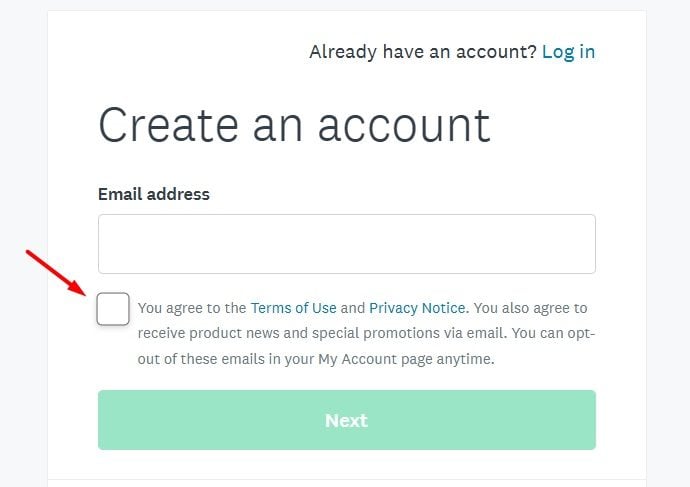
If you run a travel website and collect personal information about visitors, you legally need to have a Privacy Policy.
Your Privacy Policy should disclose the following information:
Your Privacy Policy should be easily accessible. The best way to do this is to include it in your website's footer. You should also provide a link to your Privacy Policy when collecting personal information, such as during account creation, email newsletter sign-up, or during the checkout process.
Always get users to give valid legal consent to your Privacy Policy by requiring them to check a box that indicates they have read and agree to your Privacy Policy.
Comply with the law with our agreements, policies, and consent banners. Everything is included.
Disclaimer
This article is not a substitute for professional legal advice. This article does not create an attorney-client relationship, nor is it a solicitation to offer legal advice.
Last updated on
Appears in
Related articles
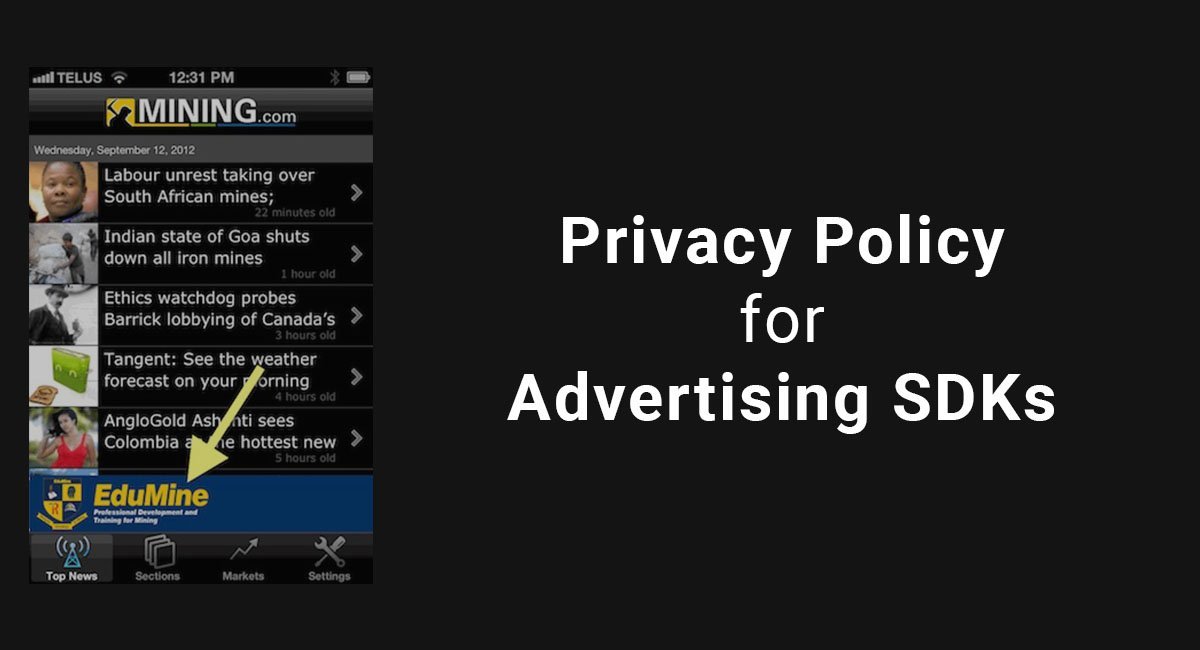
People love free apps. Unfortunately, to keep apps free, different types of in-app advertising are usually included in free apps. These advertisements can include everything from 30-second videos a user must watch every so often while using the app, a banner bar located somewhere on the main page of the app.
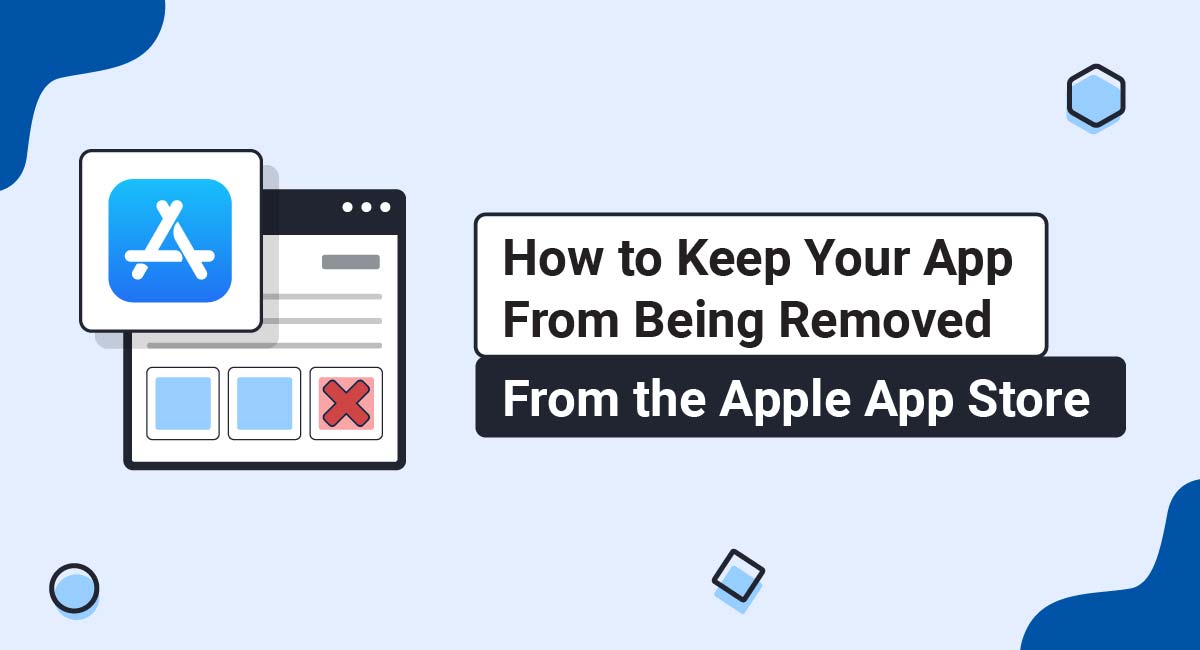
If your business provides an app via Apple's App Store then there are certain requirements you need to be aware of in order to keep your app from being delisted. This article will take you through those requirements and teach you everything you need to know in order to keep your.
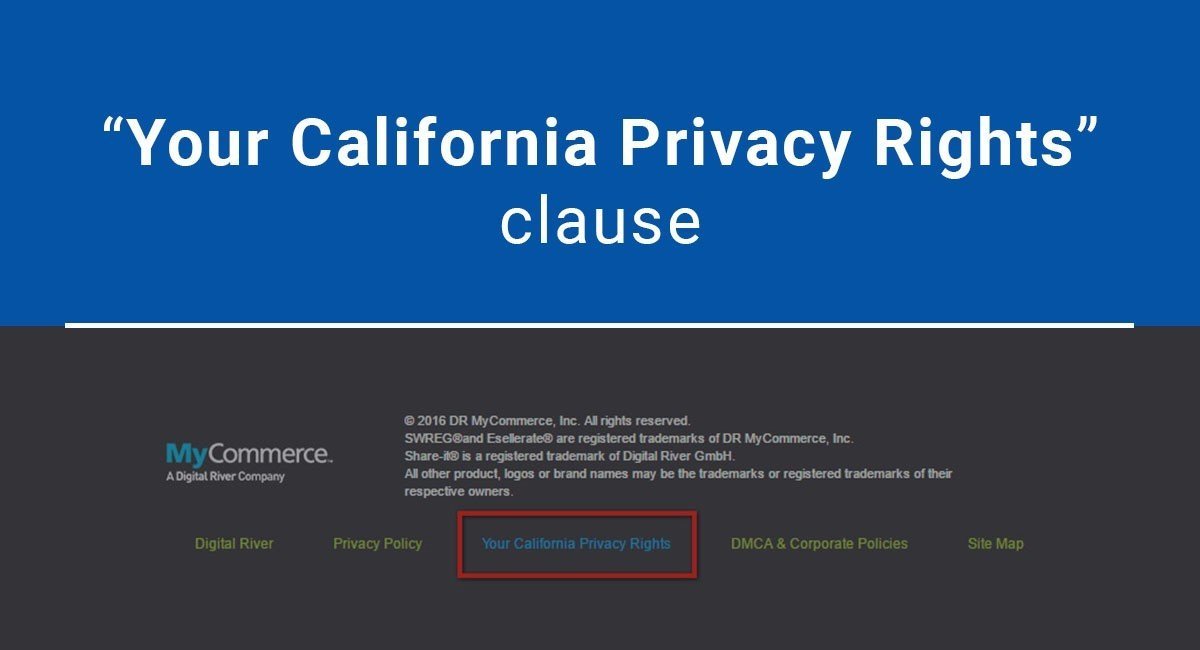
You have probably noticed how many websites include a "California Privacy Rights" clause somewhere within their Privacy Policy agreements, and oftentimes link separately to this clause from their website's footer section. This kind of clause is required for certain businesses by the "California Civil Code Section 1798.83" also known as California's.
Comply with the law with our agreements, policies, tools and cookie consent banners. Everything you need is included.
Disclaimer: Legal information is not legal advice, read the disclaimer. The information provided on this site is not legal advice, does not constitute a lawyer referral service, and no attorney-client or confidential relationship is or will be formed by use of the site.
Copyright © 2012 - 2024 TermsFeed ® . All rights reserved.